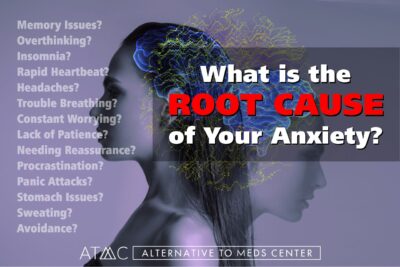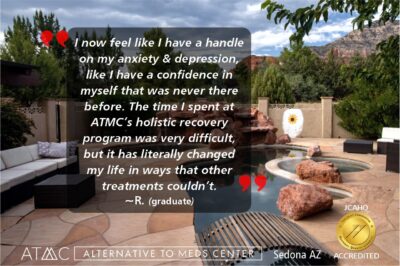Last Updated on February 21, 2024 by
Alternative to Meds Editorial Team
Medically Reviewed by Dr Samuel Lee MD
Table of Contents:

Last Updated on February 21, 2024 by
Alternative to Meds Editorial Team
Medically Reviewed by Dr Samuel Lee MD

Benzodiazepines, also called benzos or tranquilizers, act on the central nervous system to quell the symptoms typically associated with anxiety disorders. They effectively quiet the mind, relax the body, and encourage better rest by reducing stress. However, benzodiazepines are the most widely abused prescription medications after opioid medications.1
All benzodiazepine medications carry a risk of addiction, but these drugs do not maintain efficacy over time. Eventually, this erosion of effectiveness and developing tolerance can easily pave the way to addiction and dependence. Additionally, when a person suddenly stops taking a benzodiazepine prescription the withdrawals may be accompanied by a sudden and intense resurgence of prior symptoms.
For example, if a person took benzodiazepines to stop having anxiety attacks and decides to stop taking the drug after several months with no attacks, the person may experience very severe anxiety attacks a few days after the last dose. Anyone taking a benzo prescription should never stop taking the drug without consulting the prescribing doctor. The physician can recommend a cessation plan to slowly taper the patient’s benzo consumption until he or she can stop taking the medication entirely without risking a severe resurgence of prior symptoms. Unfortunately, the majority of doctors are not specifically trained in how to successfully taper a patient from benzodiazepines and are unaware of holistic remedies that can assist and soften the process. At Alternative to Meds Center, this is our specialty.
Benzo alternatives can help patients struggling with anxiety, insomnia, or other unwanted symptoms, avoid the most dangerous aspect of benzodiazepine medication — addiction. Medical researchers suspected a high potential of addiction to benzodiazepines since the 1970s. Later research confirmed this to be a major concern.20 Today, prescribing doctors are cautioned by drug regulators to provide their prescriptions for short-term use, with cessation in mind.1
Currently, benzodiazepine use and misuse in the US is a growing concern to drug regulators and the medical community as a whole.7,14,16
Like any other addictive drug, benzo addiction will almost invariably lead to tolerance, and the person with the benzo addiction will need larger doses to feel the desired effects. Some turn to alternative delivery methods for more potent doses, such as crushing pills and snorting the powder instead of taking them orally as intended.
Benzo overdose can cause severe weakness, confusion, convulsions, seizures, respiratory failure, coma, or even death. They may also cause a slowed heart rate or heart failure.
Long-term use of benzodiazepines is associated with impaired cognitive function. Benzodiazepines are not safe for long-term use. This is especially tragic since there are so many safer effective therapies for natural mental health that are freely available and easy to obtain and put into practice.17

Using expressive visual art can be a very constructive way to overcome anxiety disorder symptoms and avoid benzodiazepine addiction. ATMC provides the materials and instructions for patients to incorporate art therapy into their individual treatment plans.
ATMC caregivers and therapists use a variety of environmental medicine techniques to better understand each patient on an individual level. Environmental medicine requires analyzing a patient’s unique genetic profile to identify immune system irregularities, DNA damage, and hormonal imbalances that may be behind anxiety symptoms.
A neurotoxin is any substance that damages nerve cells. Some neurotoxins over-excite nerve cells to death and others interfere with mood expression. Exposure to various toxins and chemicals including pesticides, carbon dioxide, and many others commonly found in day-to-day life including the workplace is known to cause neurotoxic symptoms, and ATMC’s neurotoxin treatment program focuses on removing these substances safely for each individual patient.11-13
Various neurotransmitters like dopamine and serotonin influence mood and are necessary for human health. ATMC administers nontoxic amino acid precursors to effectively replace low neurotransmitter levels and help the body overcome neurotransmitter deficiencies in the body.
The basis of orthomolecular medicine is preventing and treating diseases by supplying a patient with naturally-occurring substances that normally exist within the human body. This means no foreign substances and no drugs, only replacement of vital substances that naturally occur within human physiology. Nutrition, including lab testing for deficiencies and their correction, are effective mental health tools. Specific plant-based remedies have also received much testing and have proven as effective or more effective than drug therapies for many mental health symptoms.
Acupuncture has a long history as a part of traditional Chinese medicine dating back thousands of years. The practice involves placing sterilized acupuncture needles on various pressure points on the body to stimulate neurohormonal responses. In ancient China, practitioners believed the needles released the body’s natural flow of “qi,” or spiritual energy. Proper qi flow is essential to good health in traditional Chinese medicine. Today, most medical professionals do not recommend acupuncture as a primary treatment, but they will not discourage patients from trying it if other treatments fail or if the patient insists on non-pharmaceutical, non-invasive treatment. Many people who undergo acupuncture report feelings of euphoria and lower pain sensations, and the relaxing effects of acupuncture can be tremendously beneficial to those struggling with anxiety or other unwanted symptoms.
Psychological therapies that are clinically proven effective include CBT, mindfulness meditation, and learned relaxation therapies.6-8
Physical exercise, therapeutic massage, exposure to sunlight, and other physical therapies have been found highly effective in alleviating mental health symptoms without drugs. Other benefits include improved general and cardio fitness, reduced blood pressure, weight loss, better sleep, increased energy, increased interest in sex, and many others.18,19

Many people who develop benzodiazepine addictions do not realize they are addicted until it is too late. They may attempt to stop taking benzos only to experience a sudden strong resurgence of anxiety symptoms, and this encourages them to start taking benzos again. A person in this situation may accidentally take too much out of panic or desire to curb symptoms as quickly as possible. Benzos can cause potentially fatal overdoses, so sudden cessation followed by large doses of benzos is an extremely dangerous pattern.
Download Our Alternatives to Benzodiazepines eBook
Benzodiazepine medications may be effective at treating anxiety symptoms in the short term, but they are risky for long-term use. A person taking benzos should only do so for relief from acute symptoms and look for additional treatments to address the underlying cause of his or her anxiety symptoms. ATMC does not believe in replacing one addiction with another. We use various holistic treatments to help patients on their recovery journeys, and we understand the severity of benzodiazepine addiction, as well as the severity of ruinous mental health symptoms. Considering the extreme risks presented by benzodiazepine medications, anyone taking them should expect to stop at some point in the near future, and alternative treatments can help make the transition off of benzos much easier. We hope this information has helped answer whether benzodiazepines are necessary to treat anxiety. Please reach out to us for more help and assistance.
1. Pelissolo A, Bisserbe JC. Dépendance aux benzodiazépines. Aspects cliniques et biologiques [Dependence on benzodiazepines. Clinical and biological aspects]. Encephale. 1994 Mar-Apr;20(2):147-57. French. PMID: 7914165.[cited 2022 Sept 12]
2. Lader M. Long-term anxiolytic therapy: the issue of drug withdrawal. J Clin Psychiatry. 1987 Dec;48 Suppl:12-6. PMID: 2891684. [cited 2022 Sept 12]
3. Sussman N. Treating anxiety while minimizing abuse and dependence. J Clin Psychiatry. 1993 May;54 Suppl:44-51. PMID: 8099577. [cited 2022 Sept 12]
4. Pétursson H. The benzodiazepine withdrawal syndrome. Addiction. 1994 Nov;89(11):1455-9. doi: 10.1111/j.1360-0443.1994.tb03743.x. PMID: 7841856.[cited 2022 Sept 12]
5. Saeed SA, Cunningham K, Bloch RM. Depression and Anxiety Disorders: Benefits of Exercise, Yoga, and Meditation. Am Fam Physician. 2019 May 15;99(10):620-627. PMID: 31083878. [cited 2022 Sept 12]
6. Marchand WR. Mindfulness meditation practices as adjunctive treatments for psychiatric disorders. Psychiatr Clin North Am. 2013 Mar;36(1):141-52. doi: 10.1016/j.psc.2013.01.002. PMID: 23538083. [cited 2022 Sept 12]
7. Maust DT, Lin LA, Blow FC. Benzodiazepine Use and Misuse Among Adults in the United States. Psychiatr Serv. 2019 Feb 1;70(2):97-106. doi: 10.1176/appi.ps.201800321. Epub 2018 Dec 17. PMID: 30554562; PMCID: PMC6358464. [cited 2022 Sept 12]
8. Borza L. Cognitive-behavioral therapy for generalized anxiety. Dialogues Clin Neurosci. 2017 Jun;19(2):203-208. doi: 10.31887/DCNS.2017.19.2/lborza. PMID: 28867944; PMCID: PMC5573564. [cited 2022 Sept 12]
9. Yeung KS, Hernandez M, Mao JJ, Haviland I, Gubili J. Herbal medicine for depression and anxiety: A systematic review with assessment of potential psycho-oncologic relevance. Phytother Res. 2018 May;32(5):865-891. doi: 10.1002/ptr.6033. Epub 2018 Feb 21. PMID: 29464801; PMCID: PMC5938102. [cited 2022 Sept 12]
10. Fajemiroye JO, da Silva DM, de Oliveira DR, Costa EA. Treatment of anxiety and depression: medicinal plants in retrospect. Fundam Clin Pharmacol. 2016 Jun;30(3):198-215. doi: 10.1111/fcp.12186. Epub 2016 Mar 4. PMID: 26851117. [cited 2022 Sept 12]
11. Adamec R. Modelling anxiety disorders following chemical exposures. Toxicol Ind Health. 1994 Jul-Oct;10(4-5):391-420. PMID: 7778105.[cited 2022 Sept 12]
12. Dager SR, Holland JP, Cowley DS, Dunner DL. Panic disorder precipitated by exposure to organic solvents in the work place. Am J Psychiatry. 1987 Aug;144(8):1056-8. doi: 10.1176/ajp.144.8.1056. PMID: 3605427.[cited 2022 Sept 12]
13. Griez E. Induction expérimentale de l’anxiété. Le cas du dioxyde de carbone [Experimental induction of anxiety. The case of carbon dioxide]. Encephale. 1987 Nov-Dec;13(6):335-9. French. PMID: 3131110.[cited 2022 Sept 12]
14. He Q, Chen X, Wu T, Li L, Fei X. Risk of Dementia in Long-Term Benzodiazepine Users: Evidence from a Meta-Analysis of Observational Studies. J Clin Neurol. 2019 Jan;15(1):9-19. doi: 10.3988/jcn.2019.15.1.9. Epub 2018 Oct 26. PMID: 30375757; PMCID: PMC6325366.[cited 2022 Sept 12]
15. Schutte-Rodin S, Broch L, Buysse D, Dorsey C, Sateia M. Clinical guideline for the evaluation and management of chronic insomnia in adults. J Clin Sleep Med. 2008 Oct 15;4(5):487-504. PMID: 18853708; PMCID: PMC2576317.[cited 2022 Sept 12]
16. Kleinman RA, Weiss RD. Benzodiazepine-Involved Overdose Deaths in the USA: 2000-2019. J Gen Intern Med. 2022 Jun;37(8):2103-2109. doi: 10.1007/s11606-021-07035-6. Epub 2022 Apr 12. PMID: 35415793; PMCID: PMC9198172.[cited 2022 Sept 12]
17. Barker MJ, Greenwood KM, Jackson M, Crowe SF. Cognitive effects of long-term benzodiazepine use: a meta-analysis. CNS Drugs. 2004;18(1):37-48. doi: 10.2165/00023210-200418010-00004. PMID: 14731058. [cited 2022 Sept 12]
18. Sharma A, Madaan V, Petty FD. Exercise for mental health. Prim Care Companion J Clin Psychiatry. 2006;8(2):106. doi: 10.4088/pcc.v08n0208a. PMID: 16862239; PMCID: PMC1470658. [cited 2022 Sept 12]
19. Carek PJ, Laibstain SE, Carek SM. Exercise for the treatment of depression and anxiety. Int J Psychiatry Med. 2011;41(1):15-28. doi: 10.2190/PM.41.1.c. PMID: 21495519. [cited 2022 Sept 12]
20. Lader M. History of benzodiazepine dependence. J Subst Abuse Treat. 1991;8(1-2):53-9. doi: 10.1016/0740-5472(91)90027-8. PMID: 1675692. [cited 2022 Sept 12]
Originally Published Apr 22, 2019 by Diane Ridaeus

Dr. Samuel Lee is a board-certified psychiatrist, specializing in a spiritually-based mental health discipline and integrative approaches. He graduated with an MD at Loma Linda University School of Medicine and did a residency in psychiatry at Cedars-Sinai Medical Center and University of Washington School of Medicine in Seattle. He has also been an inpatient adult psychiatrist at Kaweah Delta Mental Health Hospital and the primary attending geriatric psychiatrist at the Auerbach Inpatient Psychiatric Jewish Home Hospital. In addition, he served as the general adult outpatient psychiatrist at Kaiser Permanente. He is board-certified in psychiatry and neurology and has a B.A. Magna Cum Laude in Religion from Pacific Union College. His specialty is in natural healing techniques that promote the body’s innate ability to heal itself.

Diane is an avid supporter and researcher of natural mental health strategies. Diane received her medical writing and science communication certification through Stanford University and has published over 3 million words on the topics of holistic health, addiction, recovery, and alternative medicine. She has proudly worked with the Alternative to Meds Center since its inception and is grateful for the opportunity to help the founding members develop this world-class center that has helped so many thousands regain natural mental health.
Can you imagine being free from medications, addictive drugs, and alcohol? This is our goal and we are proving it is possible every day!
Read All StoriesView All Videos